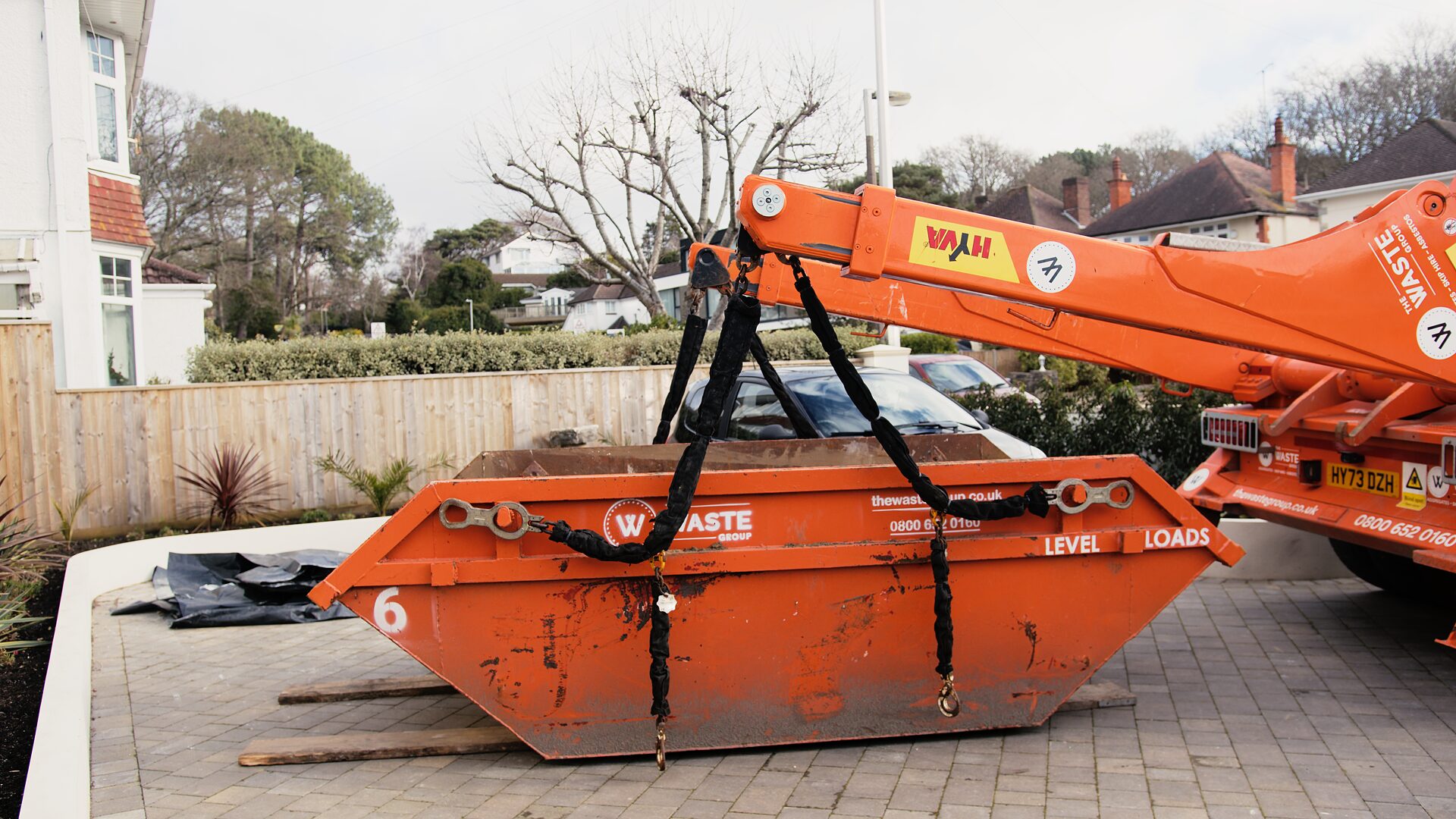Weymouth Skip Hire Made Simple
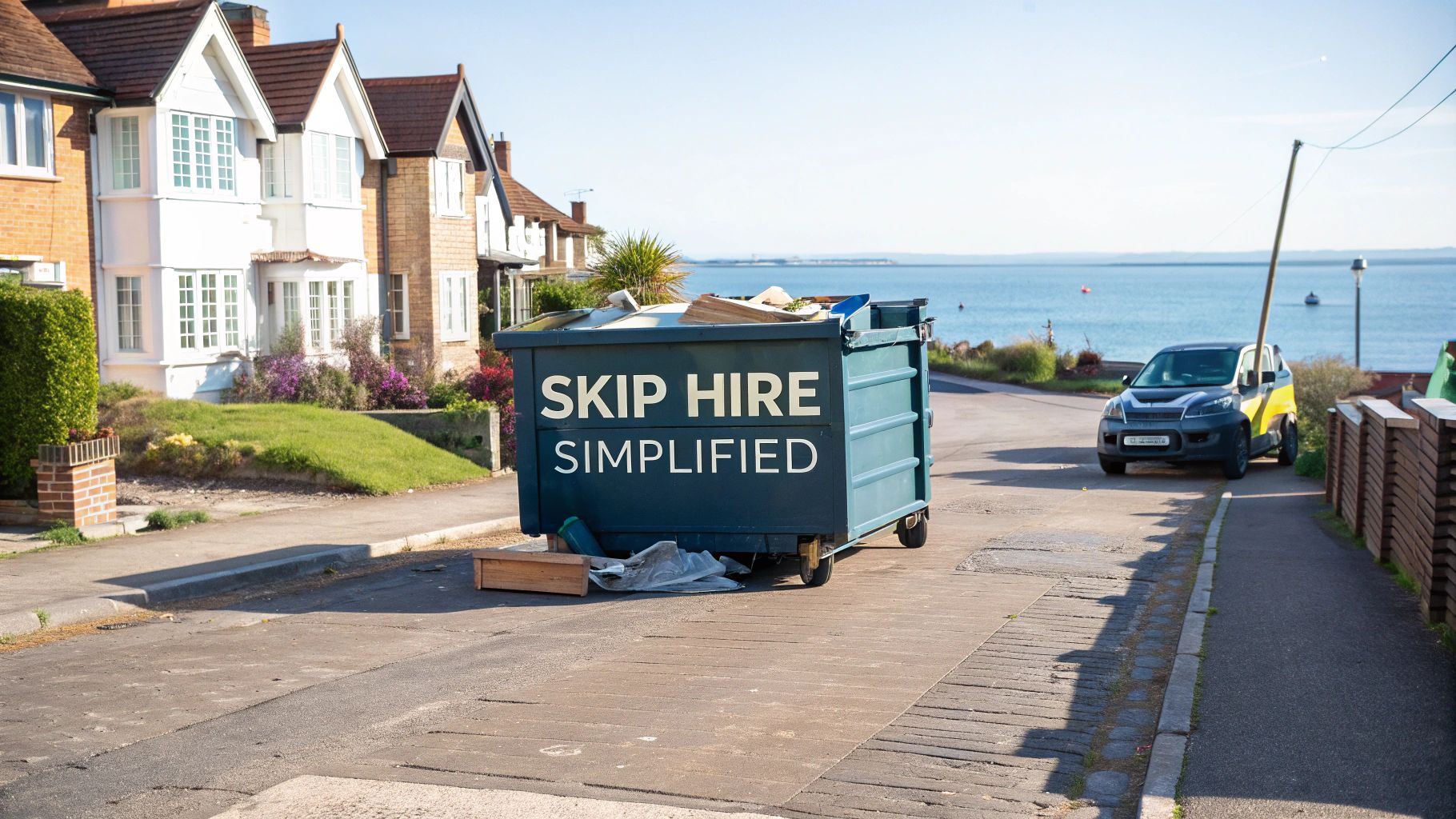
Weymouth Skip Hire Made Simple
Hiring a skip in Weymouth doesn’t have to be a headache. It really just comes down to picking a skip that’s right for your job, getting a decent price, and scheduling the delivery. When it’s done right, the whole thing is pretty painless, leaving you to get on with the actual project.
Find Your Perfect Skip in Seconds
If you’ve never hired a skip before, it can seem a bit daunting. But honestly, it’s just about matching the container to the job at hand. Whether you’re finally clearing out that old garden shed or you’re in the middle of a major home extension, there’s a skip that’s perfect for the task.
The biggest mistake people make is guessing. Guesswork either leaves you paying for a half-empty skip or, worse, frantically trying to book a second one because you’ve run out of space halfway through.
Just take a moment to think about the scale of your project. A weekend garden tidy-up is going to produce a lot less rubbish than ripping out an entire kitchen. Getting a good estimate of your waste volume before you book is the secret to making the Weymouth skip hire process smooth and cost-effective.
A Quick Project-to-Skip Guide
To help you get a better idea of what you’ll need, we’ve put together a simple table. It connects common jobs around the house with the best skip size, the usual types of waste, and a realistic idea of what it might cost. Think of it as a starting point to take the guesswork out of your decision.
Expert Tip: If you’re stuck between two sizes, it’s nearly always better to go for the slightly larger one. The small price jump between sizes is nothing compared to the cost and hassle of ordering a second skip later on.
The table below is your cheat sheet. Use it to quickly pinpoint the best option for your project and make sure you’re getting the most for your money.
Matching Your Weymouth Project to the Right Skip
Here’s a quick reference guide to help you select the most suitable skip size for your project, along with common waste types and estimated hire costs.
| Project Type | Recommended Skip Size | Common Waste Types | Estimated Cost Range |
|---|---|---|---|
| Small Garden Clearance | 2-4 Yard ‘Mini’ Skip | Soil, green waste, old pots | £120 – £180 |
| Bathroom Refit | 4-6 Yard ‘Midi’ Skip | Tiles, old fixtures, wood, plasterboard | £180 – £260 |
| Kitchen Renovation | 6 Yard ‘Small Builders’ | Old units, worktops, flooring | £250 – £300 |
| House Clearance | 8 Yard ‘Builders’ Skip | Furniture, carpets, general waste | £280 – £350 |
| Major Construction | 12 Yard ‘Maxi’ Skip | Bricks, concrete, mixed construction debris | £380 – £450+ |
From small domestic clear-outs to larger building jobs, this guide covers the most common scenarios you’re likely to come across in Weymouth. It should give you the confidence to book the right skip first time.
Choosing the Right Skip Size for Your Job
Getting the skip size right is probably the single most important decision you’ll make when you hire a skip in Weymouth. It’s a classic rookie mistake. Go too small, and you’re stuck with a pile of waste you can’t shift and the unexpected cost of hiring a second skip. Go too big, and you’re literally paying for empty space.
The trick is to try and visualise your waste before you even lift a finger.
It’s amazing how bulky things become once they’re broken down. A dismantled kitchen or an old garden shed takes up a surprising amount of room. You’re not just dealing with the volume, but all the awkward shapes and empty gaps that waste creates.
To get a better handle on it, try thinking in terms of standard wheelie bins. It’s a simple comparison that makes abstract cubic yards feel a lot more real and helps you properly judge what your project actually needs.
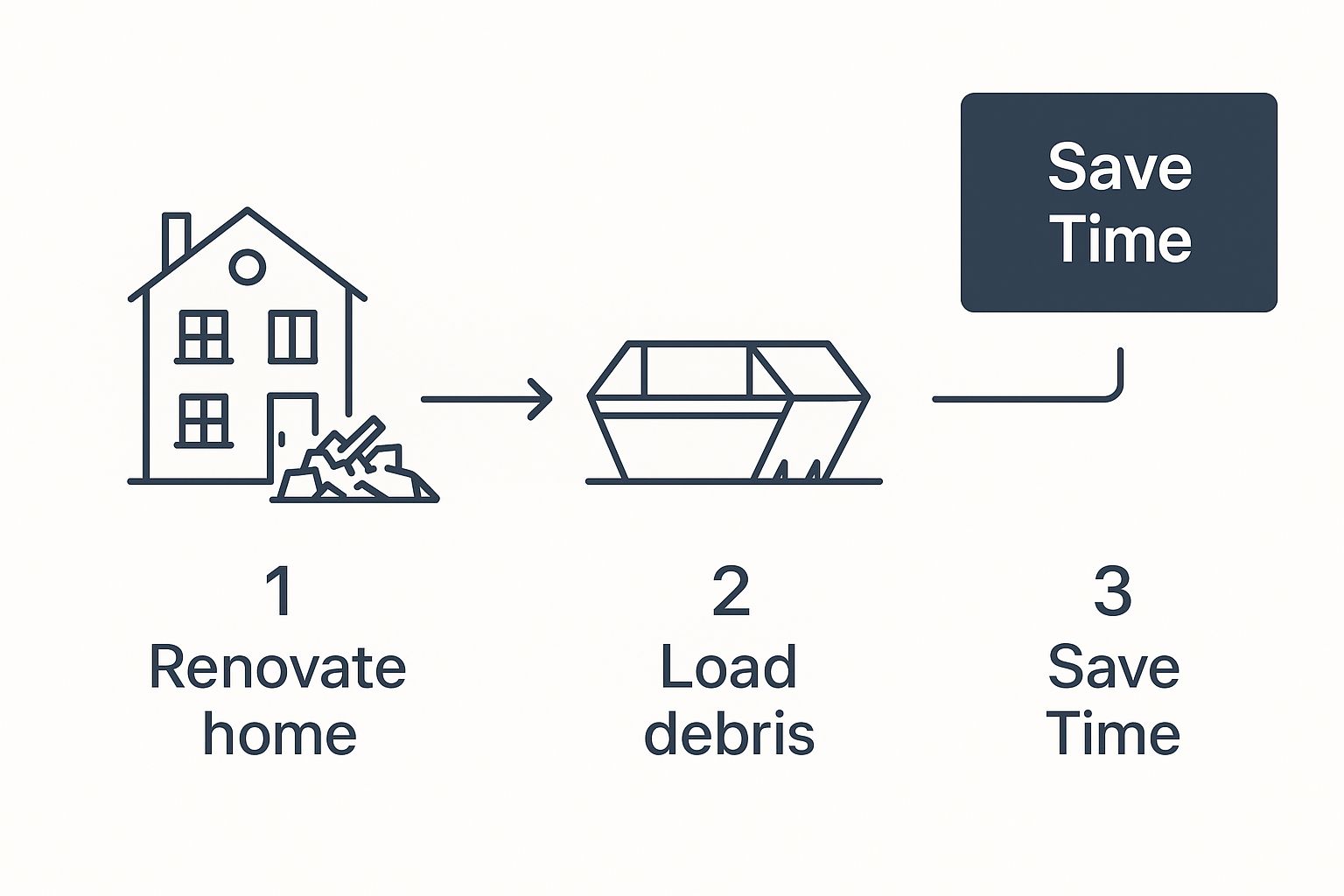
By matching your job’s scale to the right skip from the outset, you dodge the logistical headache of dealing with leftover rubbish.
From Mini Skips to Builders Skips
Let’s break down the most common sizes you’ll come across in Weymouth and what they’re genuinely good for. Don’t just get fixated on the ‘yard’ number; think about the skip’s actual footprint. Is it going to fit on your driveway without blocking the car?
- 2-4 Yard ‘Mini’ Skips: These are your best bet for smaller-scale jobs. Perfect for a weekend garden blitz, clearing out a single room, or getting rid of excess soil from a landscaping job. A 4-yarder can hold around 30-40 bin bags, so it’s compact but surprisingly roomy.
- 6 Yard ‘Small Builders’ Skip: This is easily the most popular size for home projects, and for good reason. It hits that sweet spot for a bathroom or kitchen rip-out, holding roughly 50-60 bin bags. It’s big enough for bulky items like old cabinets and flooring but still fits nicely on most driveways.
- 8 Yard ‘Builders’ Skip: When you’re tackling something bigger like a full house clearance or a small extension, the 8-yard skip is your go-to workhorse. With space for about 70-80 bin bags, it can handle a mixture of heavy construction waste like bricks and rubble alongside lighter household clutter.
Choosing a skip is a bit like packing a suitcase for a holiday—it’s always better to have a little extra room than to be struggling to close the lid. If you find yourself hesitating between two sizes, opting for the larger one almost always proves to be the more economical and stress-free decision in the long run.
Measuring Up for a Smooth Delivery
It’s not just about what you can fit in the skip. You have to consider the physical size of the skip and the lorry that’s delivering it. A standard 8-yard skip is about the same size as a small car. Before you confirm your booking, get the tape measure out and check the spot where you want it to go.
You need to make sure there’s enough clearance not just for the skip itself, but for the lorry to get in, lower its hydraulic arms, and place it down safely. That means checking for things like overhanging tree branches, low-hanging cables, and making sure the ground is level and solid.
For a more detailed look at dimensions and capacities, you can learn more about what size skip you might need in our comprehensive guide. A few minutes with a tape measure now can save you a massive headache on delivery day.
Navigating Skip Hire Costs and Dorset Council Permits
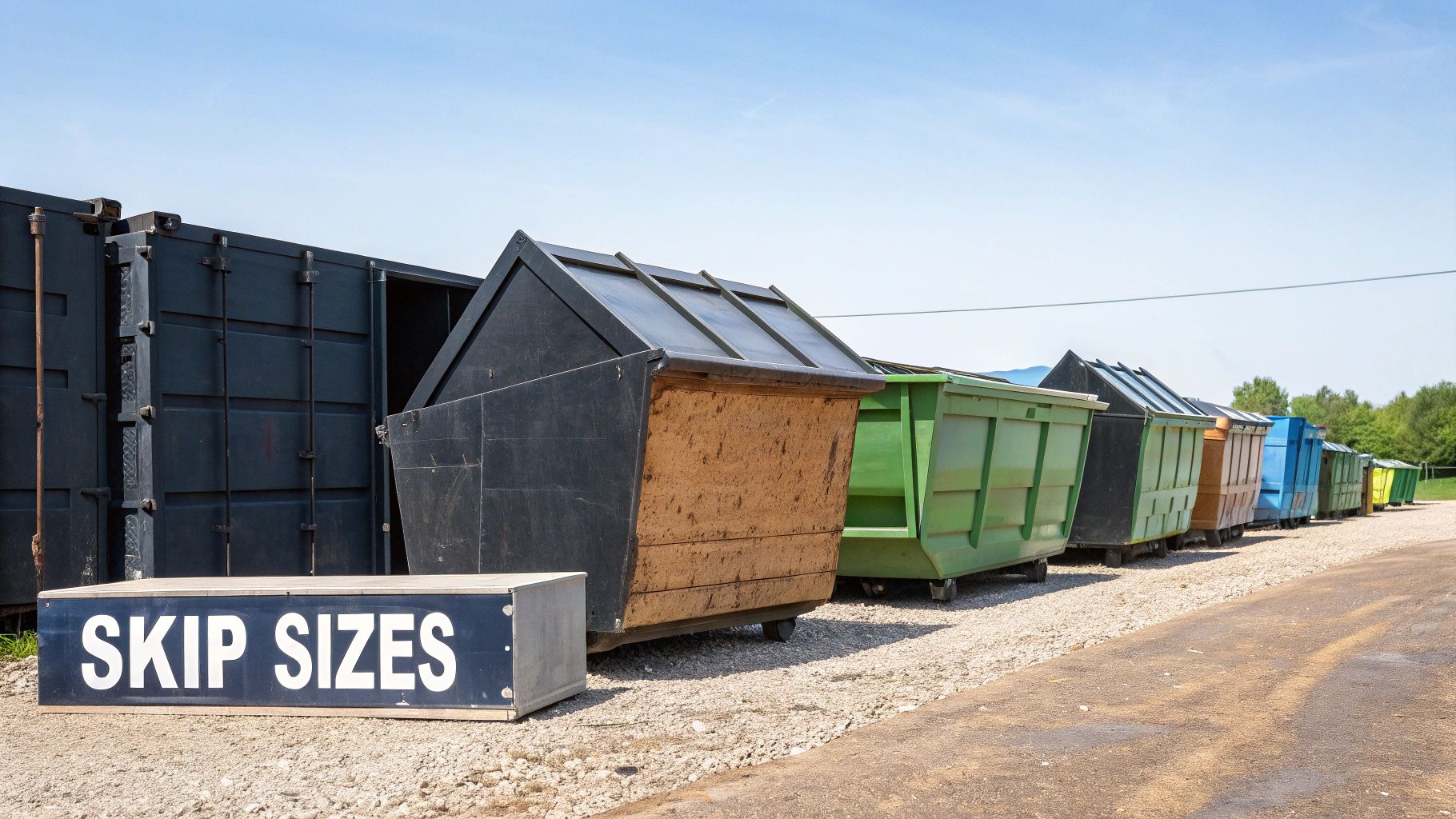
Figuring out the final price for your Weymouth skip hire goes beyond just the size of the skip. A few key things can influence your quote, from the specific waste you’re getting rid of to how long you’ll need the skip on your property. Getting your head around these elements helps you budget properly and sidestep any surprises.
The main cost drivers are pretty logical. A bigger skip will cost more than a smaller one, and the standard hire time is usually one to two weeks. Need it for longer? No problem. Most companies can sort out an extension for a small extra daily or weekly fee.
But there’s a big factor that often gets missed: government policy. The UK skip hire world is directly impacted by environmental rules, particularly the landfill tax. As of April 2025, this tax shot up to £126.15 per tonne—a massive jump from previous years. This tax makes sending waste to landfill more expensive for us, and that cost often has to be passed on to the customer. It’s a huge reason why recycling is now at the heart of any good skip hire business.
Understanding Dorset Council Skip Permits
One of the first practical hurdles is working out if you need a permit. It’s actually quite simple.
If you have a private driveway, a garden, or any other private land where the skip can sit comfortably, you do not need a permit.
But what if your only option is the street? If any part of the skip has to be placed on public land—that means the road, pavement, or even a grass verge—you are legally required to get a skip permit from Dorset Council. This isn’t just a suggestion; failing to get one can lead to a serious fine.
The good news is that your chosen skip hire company will almost always handle the permit application for you. They’ve got the experience and the direct contacts to get it sorted efficiently, saving you the paperwork headache.
Key Takeaway: Always be crystal clear with your skip hire provider about exactly where the skip will be placed when you book. They’ll know instantly if a permit is needed and can factor the cost and timeline into your quote from the get-go.
The Permit Application Process and Costs
Applying for a permit isn’t an instant thing. Dorset Council usually needs at least 3-5 working days to process an application, which means last-minute bookings for on-road skips are pretty much a no-go. It’s vital to plan ahead to keep your project on track.
The cost for a skip permit in Dorset typically lands somewhere between £30 and £60. This fee goes directly to the council to cover their admin and the temporary use of public space. It’s a separate charge from the skip hire itself and will be clearly itemised on your final invoice.
For a more detailed look at what to expect locally, our guide on Dorset skip hire prices offers some great insights. By understanding both the hire and permit costs right at the start, you can plan your budget with confidence and make sure your project runs smoothly and legally.
What You Can and Cannot Put in Your Skip
Knowing exactly what can go into your skip is crucial for a smooth and hassle-free hire. Let’s be honest, nobody wants to deal with extra charges or a refused collection. It’s well worth taking a moment to get familiar with the rules before you start loading it up.
For the most part, skips are the perfect solution for general household and construction waste. Think of them as the heavy-duty answer for all the bulky, messy stuff that just won’t fit in your regular wheelie bin.
What Is Generally Allowed
Most of the waste from your project will fall squarely into the ‘accepted’ category. Your Weymouth skip hire provider will happily take away a mix of common materials, making skips ideal for everything from a garden makeover to a full-scale renovation.
You can typically load these items without any trouble:
- General Household Waste: Think old furniture, carpets, non-electrical fittings, and all that general clutter.
- Building Debris: This includes things like bricks, concrete, rubble, soil, and hardcore.
- Wood and Metal: Old fence panels, floorboards, scrap metal, and timber offcuts are all fine.
- Garden Waste: Soil, turf, branches, and other green waste are good to go (but not food waste).
To get the most out of your skip, it’s always a good idea to look into smarter construction waste management strategies. A little bit of sorting on your end can make the whole process much more efficient.
Prohibited Items You Must Keep Out
Now for the important bit. Certain materials are strictly forbidden from being placed in a general waste skip. This is almost always for safety reasons or because they need a specialised disposal method to protect the environment.
The restricted list nearly always includes:
- Hazardous Materials: Asbestos is a definite no-go, as are paint tins, solvents, and chemicals.
- Electricals (WEEE): Items like fridges, freezers, TVs, computers, and microwaves need to be handled separately.
- Batteries and Tyres: These pose a significant fire and pollution risk.
- Plasterboard: This has to be disposed of on its own because of how it reacts with other waste in landfill.
Important Reminder: The rule of thumb is simple: if it’s hazardous, electrical, or could cause contamination, it doesn’t belong in the skip. Chucking these items in can lead to your entire load being classed as contaminated, which often means significant extra costs. Our guide on what can go in a skip gives you a much more detailed breakdown.
Despite the industry pushing for better environmental practices, the national recycling rate for commercial skip waste is stubbornly stuck at around 47%. This is often down to contamination issues. The complex regulations mean waste handlers sometimes face financial penalties for improper sorting, forcing them to prioritise compliance over recovering every last bit of material.
And finally, always remember the golden rule of loading: keep it level. Overfilling a skip beyond its marked fill line isn’t just cheeky, it’s a serious safety hazard. The driver can legally refuse to collect it, leaving you with the messy job of unloading the excess before it can be safely taken away.
Your Smooth Skip Hire Experience From Start to Finish
Hiring a skip should be one of the easiest parts of your project, not a headache. Getting it right from the start means everything else will run without a hitch. The secret? Just a little bit of prep and knowing you’re working with a proper local company.
A good Weymouth skip hire provider will walk you through it, of course, but coming to the conversation prepared makes everything quicker and easier for everyone. Before you even dial the number, try to have a clear idea of what you’re throwing out, a rough guess on the size you need, and exactly where you want the skip to live. Getting these ducks in a row first sets you up for a fast, accurate quote.
Booking Your Weymouth Skip Hire
Once you have a couple of local firms in mind, the booking call is your chance to nail down all the details. This is about more than just getting the best price; it’s about making sure the service is clear and reliable.
When you call, have this info ready to go:
- What kind of waste you have (e.g., garden clippings and soil, old bathroom suite and tiles, or just general household junk).
- The skip size you think you’ll need, based on the job.
- Your full delivery address, including the postcode.
- Your ideal delivery date (and if you have any wiggle room).
- The exact spot for the skip – is it going on a driveway, a patch of private land, or on the public road?
Don’t just give them your details, though. This is a two-way street. Ask them a few questions to make sure there are no nasty surprises down the line. A professional outfit will be more than happy to give you straight answers.
Don’t be shy about asking what happens to your rubbish. A reputable company will be totally transparent about their recycling rates and how they dispose of everything responsibly. It’s a great sign you’re dealing with pros who care about more than just dropping a metal box on your drive.
Preparing for Delivery Day
Okay, skip booked. Now a tiny bit of prep on your end will make delivery day a breeze. The biggest thing to remember is that the delivery lorry needs space—a lot of it. These are big vehicles, and they need plenty of room to get in, drop the skip, and get out safely.
Before the driver is due, just run through these quick steps:
- Clear the Drop Zone: Make sure the spot you’ve chosen for the skip is completely clear. No cars, no wheelie bins, no piles of timber—nothing in the way.
- Look Up!: Check for any low-hanging tree branches, telephone lines, or cables that could interfere with the lorry’s lifting gear.
- Protect Your Drive: If you’ve got a block-paved or tarmac drive you’re fond of, it’s a smart move to lay down a couple of sturdy wooden planks for the skip’s corners to sit on. This spreads the load and helps prevent scuffs or dents.
The Collection Process
Once your skip is full (but remember, not overfilled!), the last step is to get it collected. Most hires are for one to two weeks, but you can nearly always call for an earlier collection if you get the job done sooner. Just give the company a ring and let them know you’re all finished.
Just like with the delivery, make sure the lorry can get to the skip easily. If someone’s car is blocking it in, the driver won’t be able to lift it, and you could end up with a wasted journey fee. Once it’s collected, your waste is whisked off to a licensed facility to be sorted and recycled. Job done.
Common Questions About Hiring a Skip in Weymouth
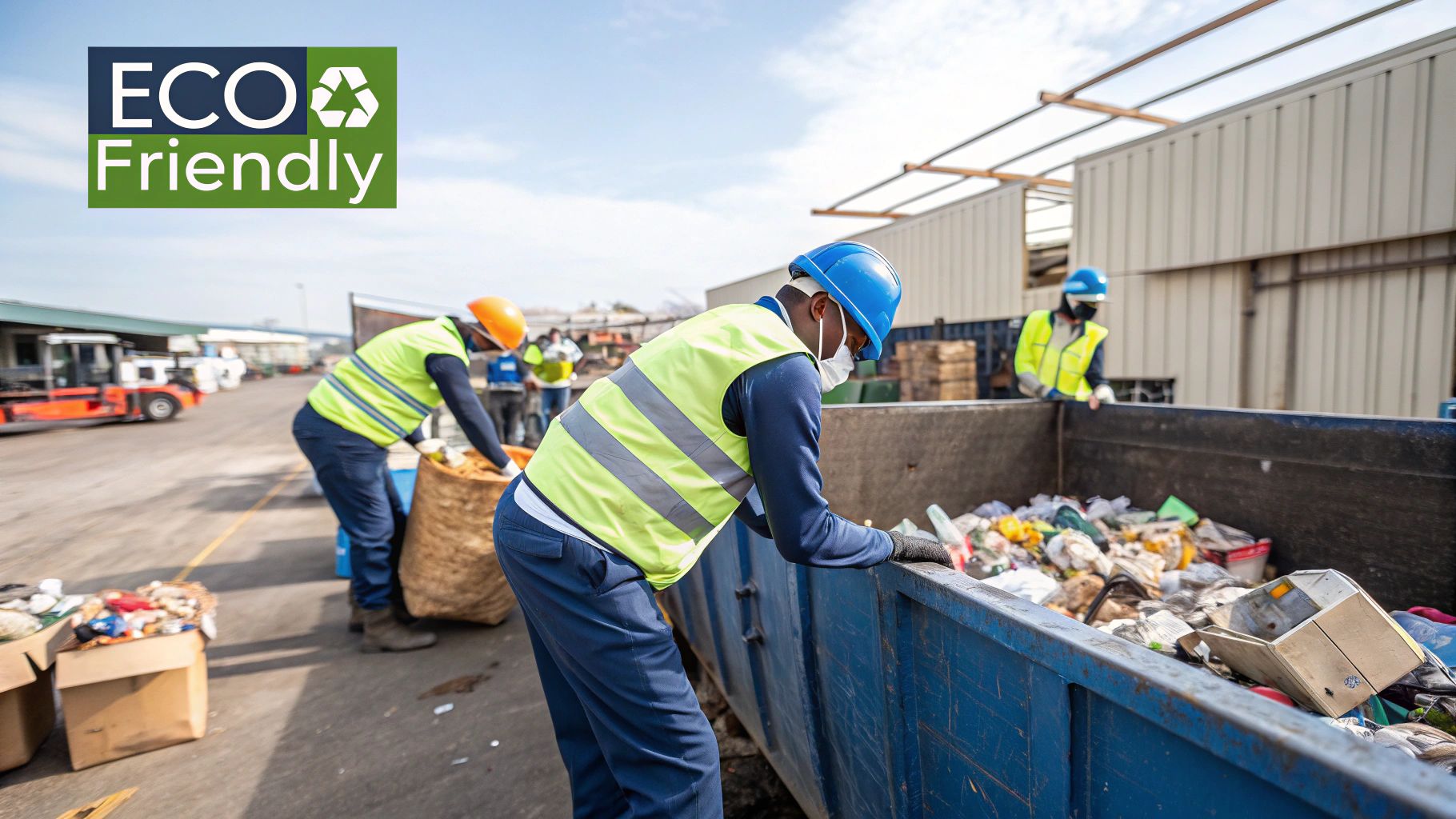
Even with the best-laid plans, a few questions always seem to pop up just when you’re ready to book. Getting straightforward answers is the key to hiring your Weymouth skip with confidence. We’ve pulled together the most common queries we hear to help you finalise your plans without any last-minute stress.
One of the biggest worries people have is about flexibility. Life happens, and projects don’t always run like clockwork. Knowing you’ve got a bit of wiggle room can make all the difference.
How Long Can I Keep a Hired Skip?
The standard hire period for a skip in Weymouth typically ranges from 7 to 14 days. For most household clear-outs, garden jobs, or minor renovations, this gives you more than enough time to get everything sorted.
But what if you finish early or need a little longer? Most companies are pretty flexible. If you’re done ahead of schedule, you can often arrange for a quicker collection. On the flip side, if your project overruns, extending the hire is usually just a case of paying a small daily or weekly fee.
Just make sure you talk to the company in advance. This is especially important if your skip is on a public road, as your council permit will have a firm expiry date.
Do I Need to Be Home for Delivery and Collection?
In short, no—not if you’ve prepared the ground properly. You don’t usually need to be present for the drop-off or the pick-up.
Clear communication is what matters most here. When you book, give precise instructions on where you want the skip placed. Crucially, you must make sure the area is completely clear of any obstructions like parked cars or leftover building materials. The same goes for collection; as long as the driver has safe and easy access, they can get the job done without you.
A Quick Tip: Snap a photo of the clear, designated spot and send it over to the hire company. It’s a simple step that prevents any mix-ups on delivery day and ensures the skip lands exactly where you need it.
What Happens to My Waste After Collection?
Once we collect your full skip, it doesn’t just disappear. It’s taken directly to a licensed waste transfer station. Here, the real work begins as the contents are meticulously sorted to recover and recycle as much as possible. The goal is always to divert waste away from landfill.
Your rubbish is separated into different streams:
- Soil and rubble are often screened and repurposed as aggregate for construction.
- Wood gets chipped for biomass fuel or turned into new board products.
- Metals are sent off for smelting and recycling into new goods.
Any reputable Weymouth skip company will take pride in their recycling rates. Many, like us, recover over 90% of the waste that comes through the gates.
Could a Skip Damage My Driveway?
It’s a valid concern. There is a small risk of damage to driveways, particularly those with tarmac or block paving. This is simply down to the combined weight of the delivery lorry and the skip itself.
Thankfully, a simple precaution can make a world of difference. Place a few sturdy wooden planks or boards down where the corners of the skip will rest. This helps to distribute the weight evenly and protect the surface underneath. While our drivers are always incredibly careful, they aren’t usually liable for surface damage, so taking this proactive step is a smart move.
For a hassle-free and reliable service for your next project, trust The Waste Group. We offer straightforward booking, competitive pricing, and a firm commitment to responsible waste management. Get your instant quote and book online today at https://www.thewastegroup.co.uk.
